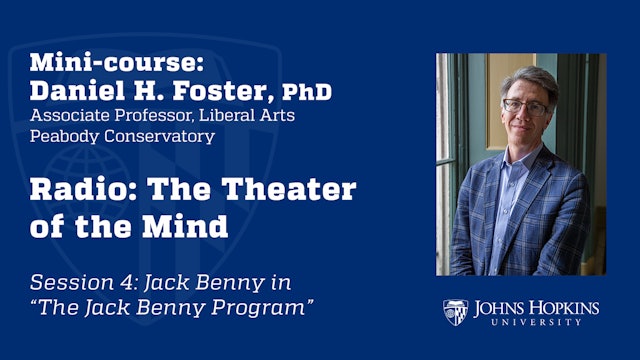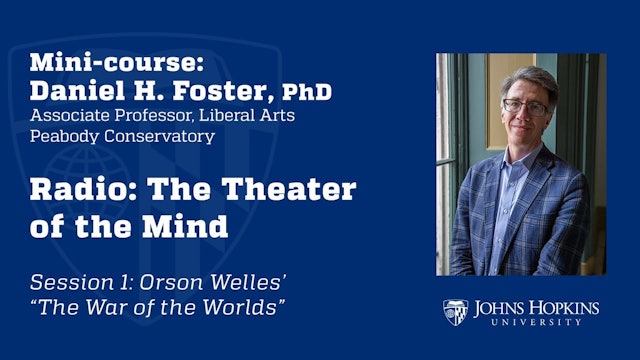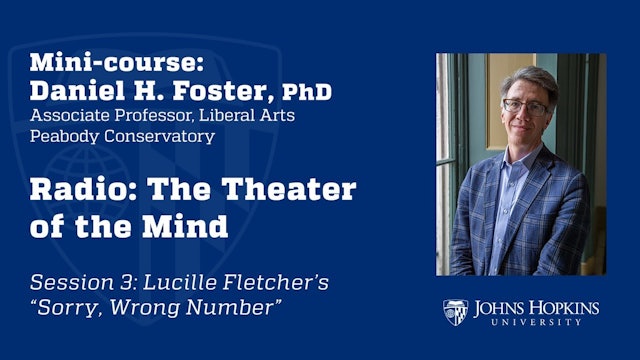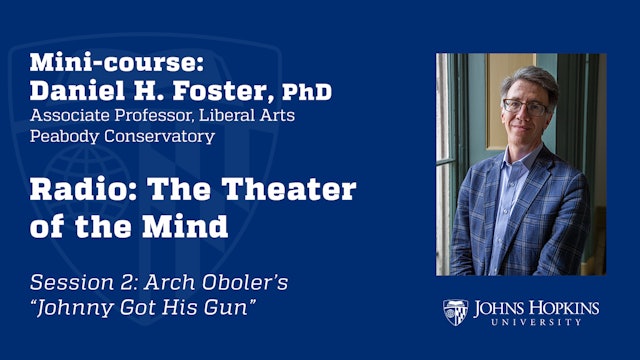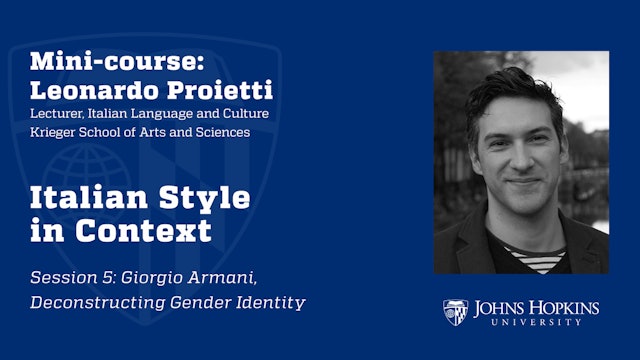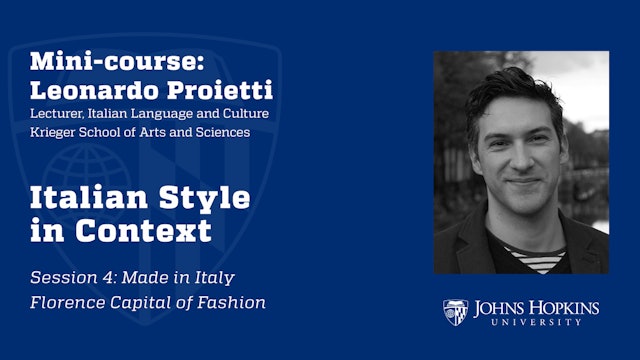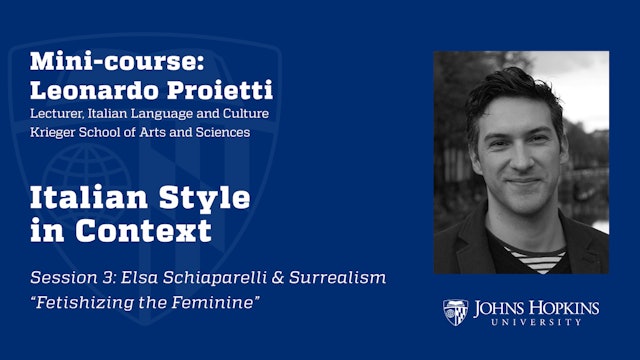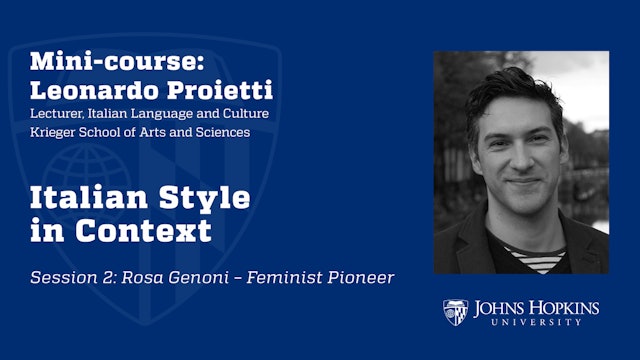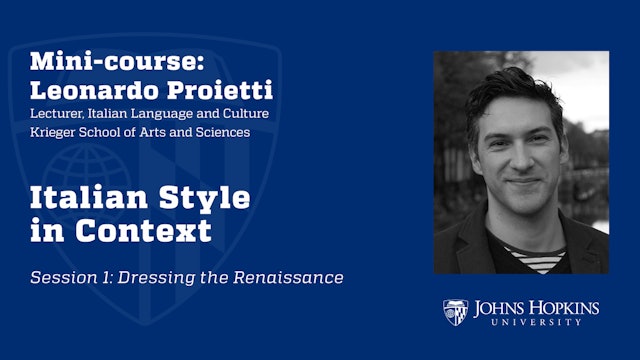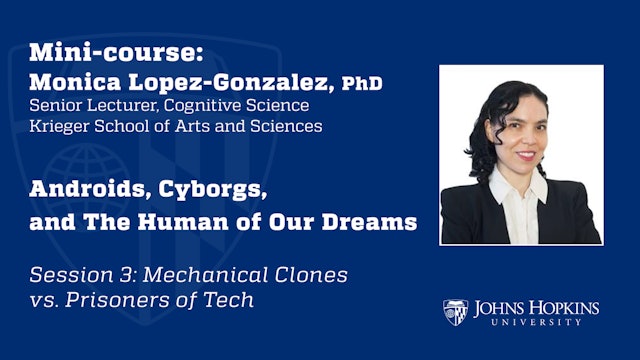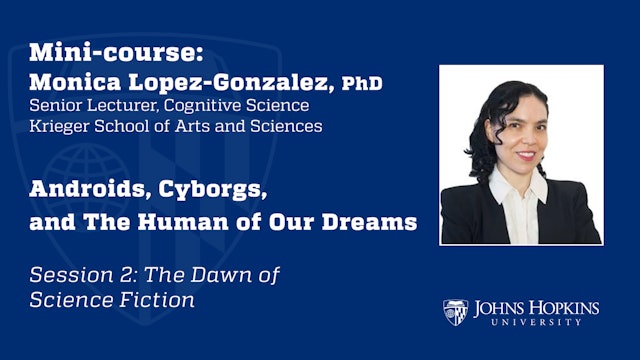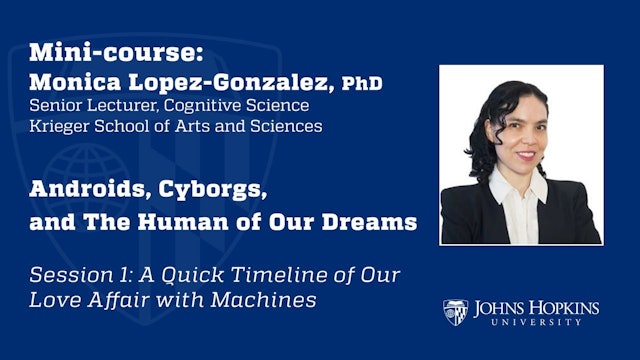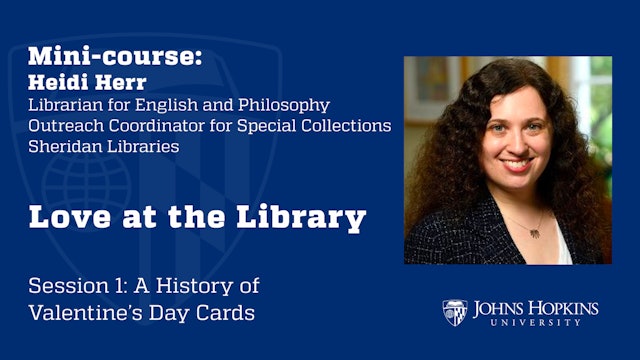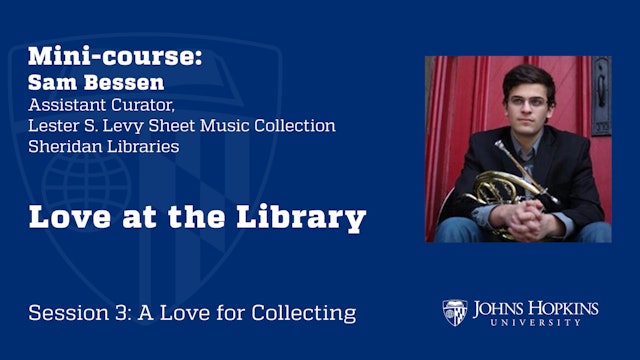Arts & Humanities
-
Session 2: Sounds of Change: Temperance & Prohibition
The Lester S. Levy Sheet Music Collection is a gem among our Special Collections holdings. This carefully curated collection of 30,000 pieces of popular sheet music is the perfect lens through which to explore US reform movements, including suffrage, emancipation, anti-war, prohibition/temperance...
-
Session 4: Radio: The Theater of the Mind: "The Jack Benny Program"
Radio is the theater of the mind, where drama is performed on the stage of your imagination. Voices become characters and sound effects props. Like bats flying blind, with radio, we create set designs in our own minds through such simple means as reverb and echo. A gasp or a held breath can thril...
-
Session 1: Radio: The Theater of the Mind: “The War of the Worlds”
Radio is the theater of the mind, where drama is performed on the stage of your imagination. Voices become characters and sound effects props. Like bats flying blind, with radio, we create set designs in our own minds through such simple means as reverb and echo. A gasp or a held breath can thril...
-
Session 3: Radio: The Theater of the Mind: Fletcher's “Sorry, Wrong Number”
Radio is the theater of the mind, where drama is performed on the stage of your imagination. Voices become characters and sound effects props. Like bats flying blind, with radio, we create set designs in our own minds through such simple means as reverb and echo. A gasp or a held breath can thril...
-
Session 2: Radio: The Theater of the Mind: Arch Oboler’s “Johnny Got His Gun”
Radio is the theater of the mind, where drama is performed on the stage of your imagination. Voices become characters and sound effects props. Like bats flying blind, with radio, we create set designs in our own minds through such simple means as reverb and echo. A gasp or a held breath can thril...
-
Session 5: Italian Style in Context
Join Leonardo Proietti, lecturer in the Italian Language and Culture department of the Krieger School of Arts and Sciences, on an exploration of some of the mayor factors that contributed to the rise of the Made in Italy as iconic design all around the world. Visit https://www.jhu.edu/hopkinsatho...
-
Session 4: Italian Style in Context
Join Leonardo Proietti, lecturer in the Italian Language and Culture department of the Krieger School of Arts and Sciences, on an exploration of some of the mayor factors that contributed to the rise of the Made in Italy as iconic design all around the world. Visit https://www.jhu.edu/hopkinsatho...
-
Session 3: Italian Style in Context
Join Leonardo Proietti, lecturer in the Italian Language and Culture department of the Krieger School of Arts and Sciences, on an exploration of some of the mayor factors that contributed to the rise of the Made in Italy as iconic design all around the world. Visit https://www.jhu.edu/hopkinsatho...
-
Session 2: Italian Style in Context
Join Leonardo Proietti, lecturer in the Italian Language and Culture department of the Krieger School of Arts and Sciences, on an exploration of some of the mayor factors that contributed to the rise of the Made in Italy as iconic design all around the world. Visit https://www.jhu.edu/hopkinsatho...
-
Session 1: Italian Style in Context
Join Leonardo Proietti, lecturer in the Italian Language and Culture department of the Krieger School of Arts and Sciences, on an exploration of some of the mayor factors that contributed to the rise of the Made in Italy as iconic design all around the world. Visit https://www.jhu.edu/hopkinsatho...
-
Session 1: Investigating the Temple of the Goddess Mut at South Karnak
Join Betsy Bryan, the Alexander Badawy Chair in Egyptian Art and Archaeology, as she shares artifacts and discoveries from twenty years of "Investigating the Temple of the Goddess Mut at South Karnak." Session 1 covers an "Introduction & Excavation." Go to www.jhu.edu/hopkinsathome to see more le...
-
Session 4: Investigating the Temple of the Goddess Mut at South Karnak
Join Betsy Bryan, the Alexander Badawy Chair in Egyptian Art and Archaeology, as she shares artifacts and discoveries from twenty years of "Investigating the Temple of the Goddess Mut at South Karnak." Session 4 involves "Interpreting the ancient New Kingdom temple and the rituals of the goddess ...
-
Session 2: Investigating the Temple of the Goddess Mut at South Karnak
Betsy Bryan, the Alexander Badawy Chair in Egyptian Art and Archaeology, shares artifacts and discoveries from twenty years of "Investigating the Temple of the Goddess Mut at South Karnak." In Session 2, she is joined by Kristian Strutt of Southampton University and David Anderson of the Universi...
-
Session 3: Investigating the Temple of the Goddess Mut at South Karnak
Betsy Bryan, the Alexander Badawy Chair in Egyptian Art and Archaeology, shares artifacts and discoveries from twenty years of "Investigating the Temple of the Goddess Mut at South Karnak." In Session 3, she is joined by Salima Ikram of the American University of Cairo. Together they address 'Bio...
-
Session 1: Chaucer: Five Canterbury Tales
Geoffrey Chaucer is sometimes called the 'father of English literature' not only because he wrote so well but because he has been, and remains, a poet who had a unique power to capture in language the foibles and strengths, the folly and wisdom, and the rich variety of perspectives that make us h...
-
Session 3: Chaucer: Five Canterbury Tales
Geoffrey Chaucer is sometimes called the 'father of English literature' not only because he wrote so well but because he has been, and remains, a poet who had a unique power to capture in language the foibles and strengths, the folly and wisdom, and the rich variety of perspectives that make us h...
-
Session 2: Chaucer: Five Canterbury Tales
Geoffrey Chaucer is sometimes called the 'father of English literature' not only because he wrote so well but because he has been, and remains, a poet who had a unique power to capture in language the foibles and strengths, the folly and wisdom, and the rich variety of perspectives that make us h...
-
Session 4: Chaucer: Five Canterbury Tales
Geoffrey Chaucer is sometimes called the 'father of English literature' not only because he wrote so well but because he has been, and remains, a poet who had a unique power to capture in language the foibles and strengths, the folly and wisdom, and the rich variety of perspectives that make us h...
-
Session 5: Chaucer: Five Canterbury Tales
Geoffrey Chaucer is sometimes called the 'father of English literature' not only because he wrote so well but because he has been, and remains, a poet who had a unique power to capture in language the foibles and strengths, the folly and wisdom, and the rich variety of perspectives that make us h...
-
Session 3: Androids, Cyborgs, and The Human of Our Dreams
Looking for some inspiration to get your summer reading done during the dog days of summer? Search no more. In this mini-course at the intersection of world literature, the history of robotics, and cognitive science, Dr. Monica Lopez-Gonzalez (A&S ’05, ’07, ’10) will lead an exploration of the ch...
-
Session 2: Androids, Cyborgs, and The Human of Our Dreams
Looking for some inspiration to get your summer reading done during the dog days of summer? Search no more. In this mini-course at the intersection of world literature, the history of robotics, and cognitive science, Dr. Monica Lopez-Gonzalez (A&S ’05, ’07, ’10) will lead an exploration of the ch...
-
Session 1: Androids, Cyborgs, and The Human of Our Dreams
In this mini-course at the intersection of world literature, the history of robotics, and cognitive science, Dr. Monica Lopez-Gonzalez (A&S ’05, ’07, ’10) will lead an exploration of the changing face of the humanoid robot and its societal consequences through selections of fictional narratives (...
-
Session 1: Love at the Library
May your heart be your guide as Sheridan Libraries staff showcase their favorite love-themed collections and teach you how to recreate historic letter-writing techniques. In this first session, you will learn about the history of Valentine’s Day cards from Outreach Librarian Heidi Herr. The valen...
-
Session 3: Love at the Library: A Love for Collecting
The Levy Sheet Music Collection is the product of decades of love. Between the purchase of a dozen songs for fifty cents each, to the dramatic purchase of a first edition of the Star Spangled Banner, Lester Levy dedicated his life to his collection and his love of history. In this lecture, Assis...


